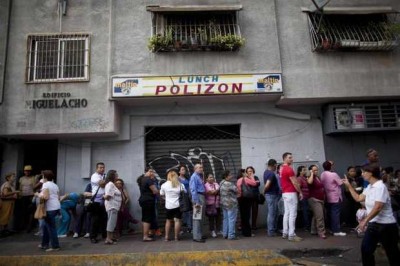
Governors in three Venezuelan states have banned overnight queuing amid huge and sometimes rowdy lines around shops across the scarcity-plagued country.
Shortages of basic consumer products from milk to toilet paper have worsened since a lull in distribution over the Christmas and New Year holidays, prompting many to wait from the early hours on foot – or in hammocks – before shops open.
The ubiquitous lines and frequent jostling for places when shop doors finally open are an embarrassment and irritation to Venezuelans across the political spectrum.
There have also been scattered protests and arrests.
“We are going to prohibit lines outside commercial establishments,” Falcon state governor Stella Lugo said late on Tuesday. “Security forces have been instructed.”
She joined two other governors, in the states of Bolivar and Yaracuy, who have announced the same measure in recent days.
“Nighttime lines are dangerous for the people,” said Bolivar Governor Francisco Rangel.
In some places, officials are also limiting access to shops to particular days according to Venezuelans’ identity card numbers.
The shortages have hurt the popularity of President Nicolas Maduro, which hit 22 percent in December, according to local pollster Datanalisis.
Foes say 15 years of “Bolivarian socialism” under his rule and that of his predecessor Hugo Chavez are to blame for Venezuela’s economic recession, the highest inflation in the Americas, and shortages.
But Maduro, 52, says a wealthy elite and opposition activists encouraged by Washington and foreign media are seeking an “economic coup” via hoarding and price-gouging.
“It’s a strategy to try and upset the people and turn them to extremes, to destabilize the country,” Maduro told the Telesur TV network late on Tuesday during a visit to Algeria.
Maduro has been visiting China, Russia and other countries to seek financing as well as action from the OPEC grouping on tumbling crude prices which have exacerbated Venezuela’s economic malaise.
In his absence, opposition leaders have been seeking to overcome internal differences and forge a unified strategy against Maduro. On Wednesday, key opposition figures called for peaceful mobilizations in the coming days.
Violence at protests last year caused the deaths of 43 people, including demonstrators, government supporters and security forces.
“This thing they called revolution is over … This government and this project are in a terminal phase,” Henrique Capriles, a former presidential candidate, told reporters.
Jailed protest leader Leopoldo Lopez, in a joint statement with two fellow hardline opposition leaders, called for Maduro’s resignation.
“Venezuela’s problem is not $40 oil. It’s the Maduro government’s corruption and incompetence and the unviable Cuban model they impose on us,” they said.
Reuters

Leave a Reply
You must be logged in to post a comment.